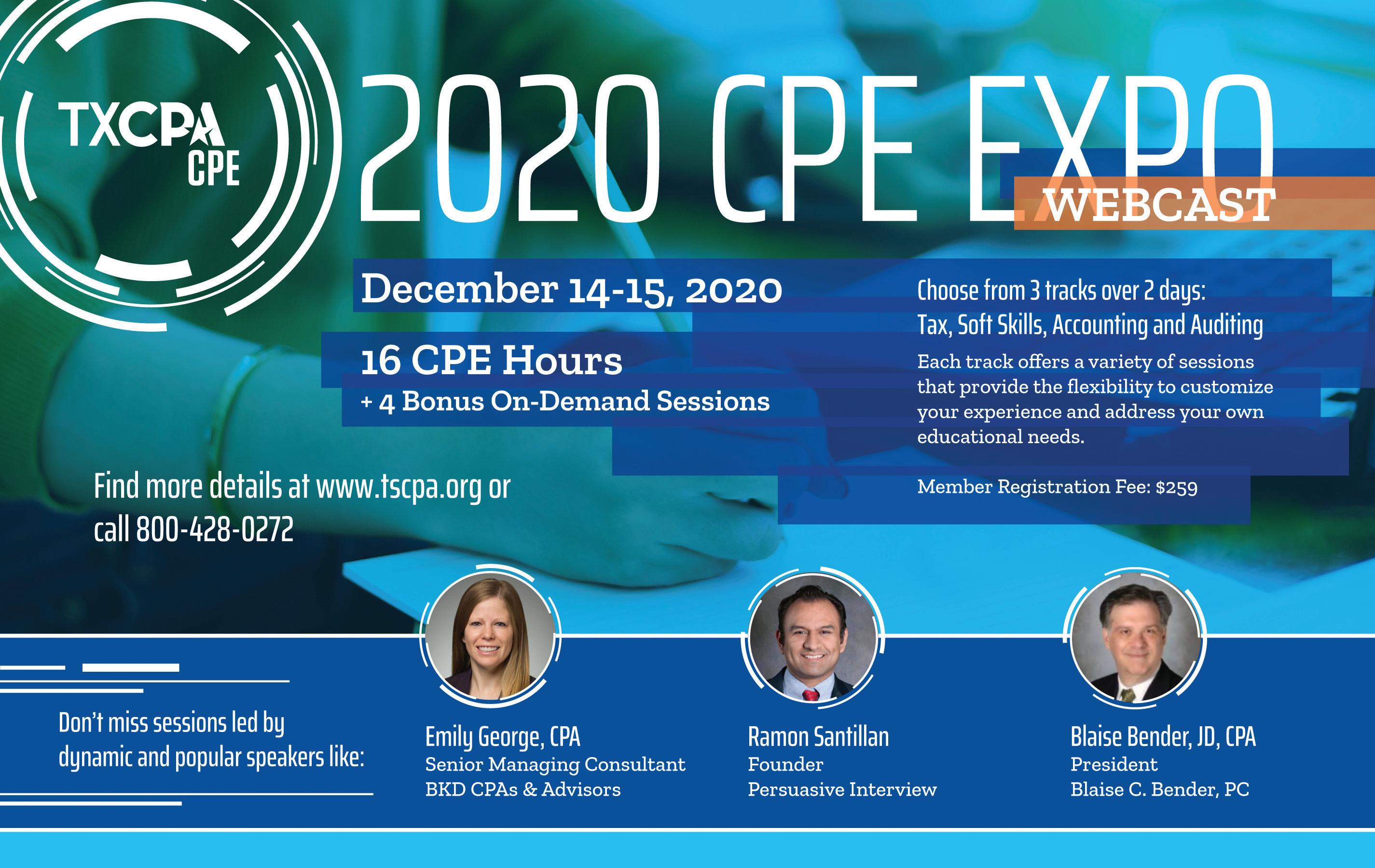
11 minute read
Capitol Interest
INTO THE UNKNOWN
By Kenneth Besserman, JD, TXCPA Director of Government Relations and Special Counsel
The 87th Texas legislative session is shaping up to know at this point is that nothing is certain and things be one of the most interesting sessions in recent will change. The Texas House will elect a new speaker memory. Texas has seen oil busts, savings and in January 2021 to replace current Speaker Dennis loan scandals, and national financial crises come Bonnen who decided not to run for reelection. With and go, and significantly interrupt budgets and new leadership on the way in the Texas House, any final legislative sessions. But the COVID-19 pandemic makes decisions on how the Texas House will operate during the past disruptions seem much less severe in comparison. legislative session will have to wait until after the session The uncertainty surrounding COVID has interrupted, stalled and shut down legislative sessions around the The unknowns go well beyond how the session will country during the last half of 2020. When the Texas operate. One of the most pressing concerns is the state Legislature convenes in January 2021, the Texas Senate, budget. Will the legislature work quickly on a state House and state leadership will be under a microscope budget and then sine die to do other legislative business as to how the legislature will operate, and how open, in future special sessions in 2021 and 2022? Will the accessible and transparent the Texas Capitol, committee legislature convene in January 2021 and take a break hearings and legislative offices will be. for a number of weeks to arrange COVID protocols and Political observers, lobbyists, legislative staff and in the House and Senate that may make doing business members of the legislature have been watching and more difficult? learning what other state legislatures have been doing commences. policies? Will there be different protocols and policies in an attempt to craft a somewhat open and accessible While the prospect of a shortened regular session does Texas Capitol and session. Many Senate and House not seem likely at the time of this writing, spikes in members have been talking, meeting and Zooming to COVID infections or staff and members of the legislature come up with policies and guidelines around committee becoming infected may lead to alternative timelines. hearings, public testimony, floor debate, and lobbyist and public access to the building and legislative offices.
Session Issues
These discussions are continuing and will continue through the end of 2020 and likely into 2021. What we do The state budget is always the most important issue that the Texas Legislature tackles every session. The budget is preeminent because it is the only item that every To paraphrase some members of the legislature, if the legislature must pass. The Texas Constitution requires it. pandemic is not a “rainy day,” then nothing is a “rainy The past few sessions, Texas has seen enormous budget day.” surpluses and large budget deficits. From the financial crisis to drops in oil prices to property tax reform, the In addition, the Comptroller’s office has indicated that legislature has seen many good times and some bad there are several billion dollars of federal COVID funding times. The COVID pandemic has had a significant impact that the state has received that may be able to be used on the state budget and legislators will have to address to offset either local or state budget issues. The state is those budget impacts. working with the federal government to understand the Comptroller Glenn Hegar has been closely monitoring the state budget and in July 2020, he issued a revised Beyond the budget, redistricting and COVID-related budget estimate based on the impact of the pandemic up legislation will likely take up much of the attention of to that point. “We went from a $3 billion surplus in the the legislature. Redistricting is often the most important current two-year budget to what now is estimated to be issue the legislature faces, but it is also the most partisan a $4.6 billion deficit. Now, and political. With part of that is going to be Texas predicted to gain lessened because state between three and five leadership instructed Congressional seats agencies to reduce their and the Texas House expenditures,” Hegar of Representatives said. “That probably saves political makeup up in about $1 billion, which is the air, the stakes could not taken into account not be higher. for the $4.6 billion deficit because those dollars are State and federal retained in the treasury.” redistricting is required Over the 2020 summer session after the census. months, the state has seen an unexpected increase
The COVID pandemic has had In normal times, the legislature would in sales tax collections, which may lessen the a significant impact on the receive the census numbers in the spring budget deficit that legislators will see in January 2021. state budget and legislators of a regular session, thereby forcing the legislature to draw This is good news, but state budget will have to address those state House and Senate maps during the session. In these writers and the Comptroller’s office acknowledge that we need budget impacts. uncertain times and with some reports that the census to watch sales tax collection numbers may not be received numbers through the end of until June or July 2021, the 2020 to get a full picture of the legislature may not be able to effects of COVID on the state budget. Since the summer address redistricting during the regular session. months, state sales tax collections are below same month 2019 collections, further making the budget that more The state House and Senate maps could be debated unpredictable and unknown. in a special session after the 2021 session, in the 2023 Texas may be in a better position than many other states issue directly the Legislative Redistricting Board – a because of the substantial balance in the Economic body composed of the lieutenant governor, speaker of the Stabilization Fund (also known as the Rainy Day Fund). House, attorney general, comptroller and General Land The Comptroller’s office is predicting that by the end Office commissioner, who are constitutionally mandated of the current budget cycle (August 2021), there will be to draw state House and Senate maps if the legislature is approximately $9 billion in the Rainy Day Fund. While unable to do so. Congressional maps will likely be drawn there is no discussion about using all or most of the Rainy by a federal court as in past redistricting cycles. Day Fund to shore up budget deficits, there certainly spending restrictions on the federal COVID funds. during the first regular regular session, or there may be an effort to move the will be some willingness by members of the legislature COVID-related legislation will also be front and center to use some of the Rainy Day Fund to help the state. during the 2021 legislative session. Cities, counties and local jurisdictions have seen the budget impacts of the pandemic just as the state has. Local governments, their tax collections significantly impacted by the pandemic, may seek some budget relief or assistance to help them meet the needs of their populations. How the legislature addresses the concerns of local governments may be one of the biggest budget debates during the session.

TXCPA’s Key Person Program

The 2021 legislative session will be like no other session. TXCPA’s Key Person program is more important now than ever before. Grassroots political action is a vital element of TXCPA’s governmental affairs efforts. Although the activities of the profession’s lobbyists are important, there is no substitute for the powerful influence of constituent communications on the way a legislator ultimately votes on legislation. Individual CPAs are constituents who vote and pay taxes in legislators' districts. They have unique expertise and represent other professional colleagues and clients in the district. Also, no one can explain the impact of accounting and tax issues on the profession and their clients better than individual CPAs. Relationships with members of the legislature will be key in making TXCPA’s voice heard, and our concerns listened to and addressed. It is vitally important that you continue to let your representatives and senators hear your voice and that you communicate with TXCPA’s government relations team so that we can effectively advocate on your behalf.
Businesses and employees have taken a hard hit during the pandemic, from the shuttering of businesses to employees being let go. While there have been some federal relief programs that have sought to lessen the financial burden, it is likely that the legislature will take a hard look at state financial relief programs, unemployment insurance, and other programs to address the continuing needs of businesses and employees. As businesses start to reopen and employees venture back to the office environment, there have been some in the legislature who have expressed a need to address liability issues relating to reopening and protect both businesses and employers/consumers. There have been some discussions in Washington, D.C., about COVIDrelated liability reform, but those discussions have been stalled and the issue has mostly devolved to state legislatures to address.
TXCPA Always Advocating for its Members and the Profession
While the 2021 legislative session operating dynamics and issues get ironed out, TXCPA has been hard at work during the pandemic making sure that the accounting profession’s voice and issues are heard in Washington, D.C., and in Austin.
In Austin, TXCPA has worked with the Texas State Board of Public Accountancy (TSBPA) to remove the 15-hour in person education requirement for upper-level accounting courses. While the education requirements are still in place, TSBPA recognized that in-person education should not be mandated for upper-level accounting courses. In addition, TXCPA worked closely with TSBPA to ensure that CPA license renewal applicants, who would ordinarily require fingerprinting per the 2019 Sunset legislation, were given some leeway in obtaining fingerprints during the pandemic when many locations and facilities were unable to accommodate or schedule fingerprinting. TSBPA will not deny a license renewal if the applicant is currently unable to obtain fingerprinting. In Washington, D.C., TXCPA made its voice heard through our Federal Tax Policy Committee, which pushed for delays in the filing deadline of federal tax returns and expanded use of digital signatures. These were important victories for the Society and our members because while CPA offices remained open during the pandemic, working with businesses and individuals on tax returns became prolonged and difficult during the pandemic. Filing deadline delays and additional IRS accommodations involving signatures and filings were important for the profession.
TXCPA has been very active in advocating for the Paycheck Protection Program (PPP) and the CARES Act, which provided much needed financial relief to employees and businesses. The Society has also been very active in urging the IRS and Small Business Administration to put out additional guidance on the new pandemic-related financial programs so that accounting professionals, businesses and taxpayers have a clear understanding of the tax consequences of these programs.
It has been a very busy 2020 for TXCPA during the pandemic. Your experience, expertise, comments, and suggestions on these issues and others have made our advocacy program a success nationally and on the state level.
Other Session Issues
Transportation funding and transportation projects have taken a central role during past legislative sessions. This 2021 session will likely not see as much transportation funding legislation because more pressing concerns will likely be front and center. In addition, Texas must always be prepared for the next natural disaster from hurricanes to flooding to tornadoes to droughts. Those issues have been addressed in recent sessions, but more work needs to be done to make sure that Texas is prepared for all eventualities.
The 2021 session may also bring forward several issues that will touch the accounting profession and all businesses. The state budget is under significant stress because of lower sales tax collections during the pandemic.
While Texas is expected to fare better than other states, there will be pressures on legislators to make cuts, raise revenues and find ways to help citizens, employees, employers, cities and other entities that have struggled to make ends meet during the pandemic. There has been legislation in other states that has sought to impose sales taxes on professional services and to remove or cut back professional licensing standards and requirements. National licensing organizations and state professional societies have taken an active role in lobbying state legislatures about the importance of rigorous licensing regimes as a way to protect the public from unscrupulous actors.
TXCPA will be monitoring and advocating on the issues of deregulation of the accounting profession and the weaking of licensure and education standards. The Society has been closely monitoring other states where professional licensing and certification standards have either been loosened or attacked by groups seeking to open the practice of licensed professions. The Society feels strongly that proper licensing and certification of professions is necessary to ensure that the public is protected and public confidence in the accounting profession is maintained.
As we all know in 2020, things can change and will change. So be prepared for the unknown.
About the Author: Kenneth Besserman, JD, is TXCPA's director of government relations and special counsel. Contact him at kbesserman@tscpa.net.











